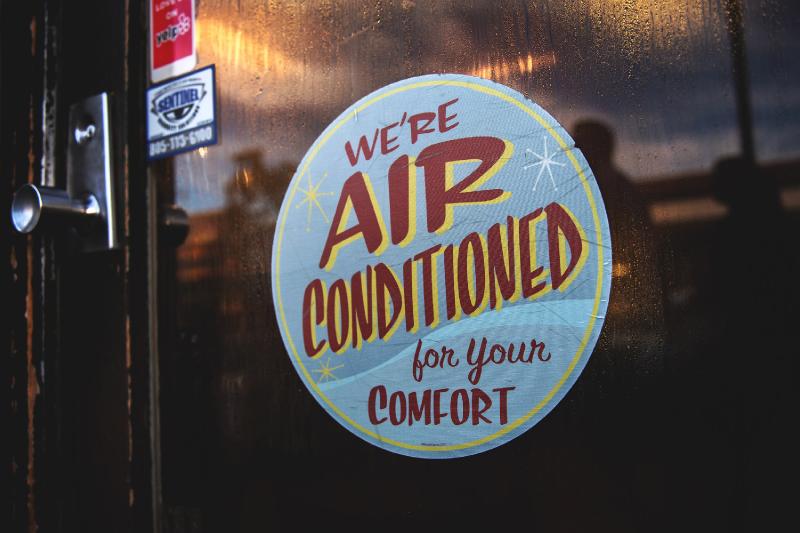Air conditioning may be factor in COVID-19 spread in the South
By: Alvin Powell (Harvard Gazette)


If the coronavirus is airborne then social distancing becomes less effective, particularly indoors. Recirculated air through air conditioning may spread the virus further. Airborne spread of the virus increases the importance of using face coverings indoors to control spread of the virus.
One speculation floating around is that the virus has mutated to become more infectious by remaining active longer while airborne. If this speculation proves out then 6 to 10 ft separation won't provide any protection.
Unless someone knows they can't spread the virus then wear a face covering. Wear a mask. Don't spread the virus. A face covering is the best substitute for herd immunity that is currently available. Herd immunity provides greater protection for everyone by reducing spread of the pathogen. Face coverings do the same thing by reducing spread of the pathogen.

Drawing on insights from another deadly airborne disease, tuberculosis, a Harvard infectious disease expert suggested Friday that air conditioning use across the southern U.S. may be a factor in spiking COVID-19 cases and that ultraviolet lights long used to sterilize the air of TB bacteria could do the same for SARS-CoV-2.
Edward Nardell, professor of medicine and of global health and social medicine at Harvard Medical School (HMS) and professor of environmental health and of immunology and infectious diseases at the Harvard T.H. Chan School of Public Health, said that hot summer temperatures can create situations similar to those in winter, when respiratory ailments tend to surge, driving people indoors to breathe — and rebreathe —air that typically is little refreshed from outside.
"The states that, in June, are already using a lot of air conditioning because of high temperatures are also the places where there's been greater increases in spread of COVID-19, suggesting more time indoors as temperatures rise," Nardell said. "The same [thing] happens in wintertime, with more time indoors."
Though transmission of the SARS-CoV-2 virus has been understood to transmit mainly through large droplets expelled during coughing, sneezing, or talking, Nardell said that evidence has risen that at least some cases of COVID-19 occur via airborne transmission. That happens when virus particles contained in smaller droplets don't settle out within six feet and instead hang in the air and drift on currents. Airborne transmission is thought to have been a factor in the coronavirus' spread among members of a Washington choir, through an apartment building in Hong Kong, and in a restaurant in Wuhan, China, Nardell said.
Airborne transmission would make people even more vulnerable to the virus in a closed room. Nardell said that in an office occupied by five people, as windows are closed and air conditioners turned on, CO2 levels rise steeply, a sign that occupants are rebreathing air in the room and from each other.
"As people go indoors in hot weather and the rebreathed air fraction goes up, the risk of infection is quite dramatic," Nardell said, adding that the data, while gathered related to tuberculosis, would apply to any infection with airborne potential.
Nardell outlined the work Friday morning during an online presentation sponsored by the Massachusetts Consortium on Pathogen Readiness (MassCPR), an HMS-led collaboration of researchers from 15 Massachusetts institutions and the Guangzhou Institute for Respiratory Health in China. MassCPR's aim is to foster research that will rapidly translate to the front lines of the COVID-19 pandemic.
The 90-minute public briefing, focused on issues raised by reopening efforts, was hosted by HMS Dean George Daley and included presentations on Americans' mobility during the pandemic, contact-tracing efforts, development of personal protective equipment, and of viral and antibody testing as ways to detect new cases and better understand the pandemic's course through society.
"We are united in our common goal to leverage our collective biomedical expertise to confront the immediate challenges of the COVID-19 pandemic," said Daley, who serves on MassCPR's steering committee. "But we are also committed to building a scientific community that is better-prepared for the next emerging pathogen."
In his presentation, Nardell, whose past work has focused on ways to combat drug-resistant tuberculosis, said a dynamic similar to that in the U.S. South is being replayed elsewhere in the world. He cited a rise in air conditioner sales in India, where the systems are designed to bring in little outside air, again increasing chances of transmission. India, with nearly 500,000 COVID-19 cases, reported 17,296 new cases and 407 deaths on Friday, according to the World Health Organization.
Nardell said that being outside or increasing ventilation inside can be effective in slowing transmission, though the ventilation systems in many corporate settings limit how much fresh air can be brought in. Portable room air cleaners also can be used, though they can have limited air flow, he said. Germicidal lamps, a technology that Nardell said is almost 100 years old, have been proven effective in protecting against tuberculosis infection and are already in use in some settings to fight SARS-CoV-2. Compared with mechanical ventilation and portable room air cleaners, the lights, according to one study, have been shown to be up to 10 times more effective, Nardell said.
The lamps are set up to shine horizontally, high in the room where sterilization is needed. Air currents, stirred in part by warmth from human bodies, circulate up to the ceiling, where the ultraviolet light kills floating pathogens, and then back down again. This technology, Nardell said, is not only proven, it can be deployed cheaply and easily in a number of settings as society reopens.
The lights are not a panacea, however, and the predominant route of transmission needs to be considered in determining whether they are appropriate. Despite the need for disinfection in nursing homes, for example, transmission there may be mainly through close contact between staff and patients, making them less-than-ideal sites for the germicidal lights, Nardell said.
"Where [the lights] should be considered in the upcoming resurgence … would be, obviously, in a health care setting, but also in public buildings such as stores, restaurants, banks, and schools," Nardell said. "We need to know where transmission is occurring to know where they should go."

Tags
Who is online
67 visitors


While it may sound nonsensical, wearing a face covering protects you by protecting others. If the coronavirus is not allowed to spread then everyone has less risk of becoming infected.
If all lives matter then wear a face covering.
This is easily and rather inexpensively defeated with the readily available systems for air handling equipment. Among other system types, a properly designed and installed UV light system in any air handling system can kill over 99% of all airborne Viruses, Bacteria, Molds and allergens.
This is old technology and readily available. Today, every air handling system should have a system like this.
AC should not be an issue with spread of Covid. No reason for it to be .....
The UV systems are only effective for air that passes through the system. The air discharge from the AC system has been disinfected. But the air must circulate through the indoor space before being drawn into the AC system.
If the coronavirus is airborne then the virus will be introduced into the air before the air can be disinfected with a UV system. And the air must circulate in the indoor space before reaching the AC intake where the air can be disinfected. While the UV system is effective for disinfecting conditioned air, that only applies to air in the conditioning system and not the ambient air in the indoor space.
So let me ask you question.
Which is better. An air handling system with UV or one without?
You are chasing your tail here ..... and honestly, i think people will try to argue about anything here .....
A UV system can help reduce spread of the virus but the claim that UV systems are 99 pct effective is way overblown.
A UV disinfectant system installed in an AC air handler doesn't eliminate the need to wear face coverings indoors. The residence time in the ambient air before disinfection means the UV system can't provide adequate protection by itself. Air circulation of the ambient air before being drawn into the AC system also indicates that 6 to 10 feet of separation indoors does not provide adequate protection.
Wear a face covering. Face coverings do more to control spread of the virus than any technological magic. You protect yourself by protecting others. Doesn't require a Harvard PhD to understand that.
Jesus, where did i say not to wear a facemasks as well? This facemask saves all crusade some of you are on is ridiculous. They aren't the end all either.
A properly designed, installed and maintained UV system (or other disinfectant system) most certainly can and DOES kill 99%+ of all viruses, bacteria and molds in the air that moves through them. That is proven science and like wearing facemasks, makes all the sense in the world.
Like i said, some folks will just find a way to argue about anything in here.
Amazing!
Face coverings control spread of the virus indoors with or without UV disinfection installed in the AC system. UV disinfection does not increase the effectiveness of face coverings in controlling the spread of the virus. And UV disinfection is not an alternative to face coverings.
It's a 'look squirrel' argument. UV disinfection was added to AC systems to control spread of legionnaires disease, molds, and pathogens that originate inside the AC system. UV disinfection is not a magic bullet that will effectively control spread of the coronavirus.
As noted earlier, no its not.
You're the only one that has brought that up. I simply stated what it can do for an Air Handling system which may have Covid circulating through it. It's a no brainer for those who are looking for a comprehensive approach to potential Covid containment.